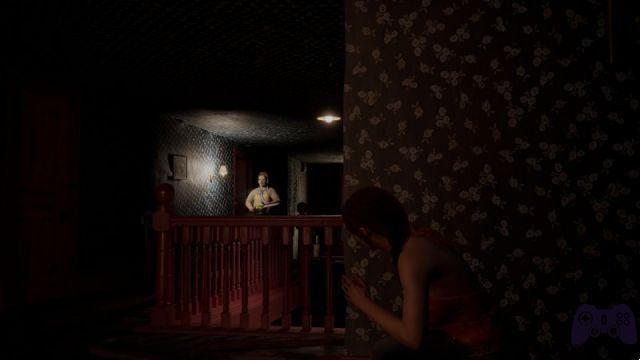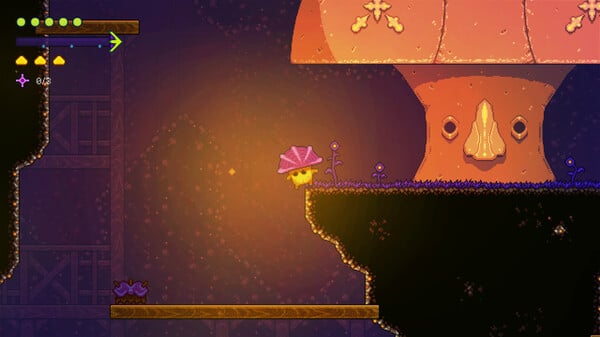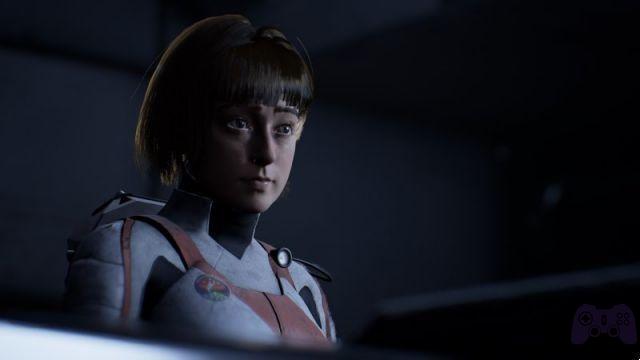When starting for the first time, Final Fantasy VII Always Crisis presents itself like magic: the unmistakable notes composed by Nobuo Uematsu warm the atmosphere, the bright green of Aerith's eyes radiates from the center of the screen, then the skyline of the Midgar metropolis opens in all its splendor, just before the The rattle of an old train accompanies Cloud and Barret's entrance to the stage. A handful of seconds are enough to go back directly to 1997, savoring for a few wonderful moments the excitement that many found - and many others expected to find - in the confines of the remake of one of the most beloved video games of all time.
Thus, the operation was presented by Square Enix as the perfect opportunity to revive the entire "compilation" of Final Fantasy 7 with total purity, immersing itself in the past ready to file the edges of a now archaic formula, giving it a new opportunity. of life to the seabed of the planet Gaia. Then, one announcement after another, the production began to be shrouded in a thick blanket of mystery. The enthusiasm was dampened by Tetsuya Nomura, who initially confirmed the desire to publish content on a monthly basis, after which he talked about the integration of a random reward system, and then concluded by underlining the desire to add unprecedented new nuances to the story he published. which he learned to love, awakening some bad memories in the hearts of Kingdom Hearts fans.
What had been interpreted as "the remake that long-time audiences deserved" has gradually revealed its true nature, raising the curtain on a formula that, despite its extraordinary successes, still surprises many fans: the from the gacha game. Final Fantasy VII Ever Crisis is first and foremost a gacha, then a reinterpretation of the narrative universe of the seventh chapter and, as a last resort, a video game: developed by Application and Square Enix Under the direction of Tetsuya Nomura and Motomu Toryiama, it was born accompanied by the great promise of retracing and expanding the entire story of Soldier, but it quickly ends up buried under the rules and limits of the reference genre, inadequate to support such a monument of the past.
It is very difficult to approach it in a lucid and objective way, because the screen constantly harbors a very strong clash between what the work could have been and what it finally revealed, staging sequences that warm the heart, but always moistening them with mechanics and deviations capable of doing so. hop. Which? Find out in ours Final Fantasy 7 Ever Crisis Review.
The Plot: "I Don't Know, Rick"

Leaving aside for a moment the questions related to the gameplay, it is necessary to address the soul of the production, the element that alone would be enough to justify its existence. The dozens of events that have been intertwined on the surface of the planet Gaia have been able to make millions of people fall in love, to the point that only the first immersion in the sea of memories is enough to wake up. old latent emotions. In Ever Crisis, however, instead of intervening with the scalpel we opted for the scissors, performing a cut and sew operation that - since the first mission, the famous Bombing Mission - Reduce sequences and dialogue to a minimum., eliminating large segments of the adventure to make room for different types of content. The descent into the heart of the Mako reactor with which the seventh episode opened lasts just a few seconds, while the escape sequence has been replaced by a colder and more practical transition to black that leaves a lot of room for the imagination.
Not to mention that, again during the opening, we quickly realize that we are not in the same confines of the original Final Fantasy VII, but in a rereading context that nods to the deviations of the recent Remake: it is as if, unlike from producers like Capcom, the Japanese company I couldn't help but rewrite their past jobs. A big difference lies in the sudden incursions into the meanders of the so-called "compilation", that is, the set of works developed around the seventh chapter of the saga, which intervene with a strange synchronization: as soon as Aerith finds herself in the wonderful backdrop of the church in Sector 6 of Migdar, the plot decides that The time has come. We come to begin to narrate Zack's story, leaving in suspense one of the most poetic and significant snapshots that emerged from the confines of the series. It must also be taken into account that none of the stories integrated up to this moment – specifically Final Fantasy 7, Crisis Core and The First Soldier – comes to fruition over the course of the 30 hours needed to see it all, leaving the task of completing this first encyclopedia in the hands of future updates.

Beyond the uncertainties in the rhythm, there is a peculiarity that will surely divide the public: the scriptwriters have chosen the theater of Ever Crisis to stage a series of unprecedented events about the historical figures of the seventh episode and some original characters. If, on the one hand, it is a great opportunity to delve into the past of several iconic members of the cast, on the other, we cannot hide the fear of witnessing a repetition of what happened on the shores of Kingdom Hearts, where the Narrative Universe was seen fragmented across platforms and genres often far from the tastes of fans.
The original story par excellence is that of The first soldier, already the protagonist of several teasers prior to the launch, especially the one that tickled the palates of fans by showing the portrait of Sephiroth when he was young. Embroidered around the images of the Battle Royale of the same name, this parenthesis immerses itself in the mission of Glenn, Lucia and Matt, three first generation soldiers sent by Shinra to the Rhadore archipelago to pursue the creation of a new Mako reactor in the heart from a region that has been isolated from the rest of the world for years. Unfortunately, the segment integrated into the launch is interrupted right at the key moment, raising even more questions about the fascinating figure of "Young Sephiroth" than had already arisen and effectively preventing us from feeling true empathy towards the new heroes.

That said, the setting of Ever Crisis continues to be a setting ready to draw various unpublished stories from the imagination, and it is precisely in these sequences where the operation takes place. comes to give his best. They are mostly small fillers, some taken from novels such as Traces of Two Pasts by Kazushige Nojima, for example the story of how Cloud met Tifa before joining the members of Avalanche, or the story that marked the arrival of the girl to the outskirts of Midgar after the abandonment of Nibelheim. If, on the one hand, these are really well-packaged adventures that move with total respect for the original characterization and They fit perfectly into the canonOn the other hand, being able to enjoy it often becomes torture, because it is precisely in these situations - aware of the interest generated - when Ever Crisis decided to raise the wall of gacha progression.
Too much gacha, too little game.

Like it or not, the recent changes brought to the gacha scene thanks to the efforts of Hoyoverse (Genshin Impact and Honkai Star Rail most notably) have taught the medium a great lesson: when the gaming experience is next-gen, the monetization component It becomes an element that can be overlooked very easily. The era in which a video game could be criticized exclusively for its nature has passed: today, numerous developers have learned to charm fans with brushstrokes and gameplay, only to then lift the curtain on Pull and coins only in the second instance. . Final Fantasy 7 Ever Crisis, however, has chosen to make itself immune to this maxim, splashing the screen with banners and extra packages not even a second after the conclusion of each chapter.
When tackling some of the most interesting narrative missions, those dedicated to the origins of the characters, it happens that you reach a point where a power level of over 60.000 is required to advance, while the characters' power level still fluctuates around 30.000. hidden behind the doors of a unbridled agriculture -or a large financial outlay, given that prices are not low- the best production segments. This is a sometimes inexplicable choice, because Square Enix itself, in the orbit of similar publications such as Brave Exvius, seemed to have understood the importance of building a narrative that can be enjoyed by any type of player, intended above all to capture them. in an emotional and playful way.

However, where Ever Crisis really fails is in the combat system: On paper it is a cocktail between the traditional Active Time Battle formula and the Final Fantasy VII Remake formula, but in practice it results in an extremely repetitive amalgam in which, alternating between offensive and defensive poses, there is nothing more than absentmindedly casting skills. , spells and occasionally Limit Break your opponents. It's a recipe designed to work. completely passive, to the point that by activating the Auto option it is possible to leave the smartphone on the pillow and enjoy the spectacle of artificial intelligence trying to defeat any enemy, even the most challenging bosses, obviously as long as you have reached the necessary level of strength. And it is an option that everyone inevitably ends up exploiting due to the intrinsic repetitiveness of the activities, to the point that when tackling them cooperatively you always end up witnessing a concert of Clouds moving perfectly synchronized to the rhythm. set by AI.

In addition to the story mode, Applibot has decided to include a whole series of "Solo" activities that cover every nuance of the complicated progression system, that is, daily missions and those aimed at strengthening the PCs and the arsenal, all based solely on combat with the except for Criterion Dungeons, in which you explore previously visited maps to challenge additional bosses. It is then that an immense panorama opens up made up of materials, coins, minerals and tools intended for progression that, if they initially seem to have a marginal impact, soon prove to be essential to enjoy the story. Materia, in particular, are presented as additional loot boxes forcibly inserted into the already loaded monetization system, almost as if they were un secondo gacha all'interno del gacha, not to mention that they require hours of real-time waiting to be synthesized, opening a bottomless pit of time or investments necessary.
Goodbye, love, Goodbye

The operation carried out by Square Enix does not need too many explanations: Final Fantasy 7 is still embraced by the unbridled love of millions of fans, and by creating a work of this type it would have been possible to quench that ancient thirst and at the same time replenish the coffers of the company. Final Fantasy 7 Always Crisis It is not a product that is missing as a gacha game., but it is in light of the weight of its brand and above all the standards imposed by other exponents of the genre: the adventure takes place most of the time in the middle of confusing menus and interfaces, adopting a passive and fragmentary combat system , without ensuring that the nature of the video game and especially that of storytelling prevail over the cumbersome economic architecture. Simply put, it is first and foremost a "gacha" and only then a "game."
The highest production values, in addition toexcellent technical construction - are found in the pillars that brought the success of the Final Fantasy 7 compilation, whose characters have not lost a bit of their magnetic charm and have been impeccably recreated, leaving the task of closing the spell to the reorganized version of the original soundtrack . This result, however, only fuels the conflict between what the work could have been and what it finally turned out to be, tickling even more the desire to be able to relive as if it were for the first time one of the greatest adventures ever. carried out. time. What is worrying, however, is the very essence of the project: analyzing the state in which similar titles are currently found, the specific fear arises that the product could close before the conclusion of the plot, although it is really difficult. and sometimes disturbing: imagine what the work could become. once you've run out of stories to tell.
Conclusions
Tested version iPhone digital delivery app store, Google Play Holygamerz.com 5.0 Readers (10) 5.5 your voteFinal Fantasy 7 Ever Crisis does not represent a missed opportunity due to its gacha nature, but rather due to the fragmentary and anachronistic execution that outlines its entire structure. The confusing menus and interfaces in which most of the experience takes place make the monetization element prevail over those of the game and the story, embroidering an intrinsically passive combat system on a long series of repetitive activities. The extraordinary strength of the original material - drawn, animated and musicalized with great care - comes to shine in the context of the unpublished facts that enrich the narrative of the compilation; But instead of elevating the production as a whole, this element ends up making us regret what could have been, leaving room for strong doubts about what it could become once the stories to tell run out.
PRO
- The original stories are very well done.
- Excellent music, animations and models.
AGAINST
- Many different farming and gacha mechanics, all invasive.
- The missions are repetitive and literally play themselves.
- Narration first cut and modified, then hindered by progression
- 80% of the game takes place between menus and confusing interfaces






